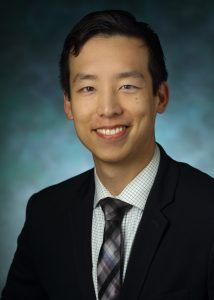When the ABR Board of Governors approved funding to sponsor the American Board of Medical Specialties (ABMS) Visiting Scholars Program starting in 2022, it provided another avenue for residents and ABR-certified early career physicians and physicists to pursue their research goals.
Four physicians have benefitted from being selected for the program so far. The current class includes Francis Deng, MD (diagnostic radiology); Leslie Chang, MD (radiation oncology); and Ria Muhlerkar, MD (radiation oncology).
Applications for the next cohort will be accepted until June 17. An informational webinar will be held tomorrow.
We asked our three current Visiting Scholars for updates on their projects and what they think of the experience.
What is the subject of your research?

Dr. Chang: My research involves the development of a patient safety and quality improvement (PSQI) curriculum within radiation oncology residencies. We developed a pilot workshop for residents to work through the different steps in the development of a departmental QI initiative in improving multidisciplinary patient handoff when adaptive radiation therapy is planned. The curriculum covers topics such as stakeholder engagement, process mapping, causal analysis, intervention implementation, and sustainability. The impact on physician education and interest in future QI initiatives will be assessed through pre-post curriculum surveys and PSQI-based exam questions.
Dr. Deng: The aim is to develop a platform that enables deliberate practice for cross-sectional image interpretation. The basic idea is a simulated diagnostic image viewing environment that allows learners to drill a microskill over and over again, such as systematically searching through a volume of CT images for a specific set of abnormalities. The platform would assess the performance of learners and whether they have met a threshold of competence for the activity. At the same time, the platform provides feedback on the correct answer and enables more efficient development of visual expertise.
Dr. Mulherkar: The subject revolves around the idea of self-efficacy, or, in other words, the confidence that individuals have in their own ability to do something. We know that women are underrepresented in many highly technical medical specialties, and this is a multifactorial issue. One potential contributor to this is lower perceived self-efficacy in women compared to men. My project uses both survey and interview techniques to determine whether there are gender-based differences in self-efficacy of medical students and residents when it comes to radiation oncology. Do women feel less confident in performing highly technical tasks associated with the specialty, and could this make them less likely to pursue the field?
How did you choose your research subject?

Dr. Chang: The decision stemmed from a personal interest in quality improvement projects in radiation oncology during my clinical training. Engaging in departmental patient safety initiatives and participating in leadership development programs equipped me with the necessary skills within a systems thinking framework to tackle this project. It had also taught me skills that have not been formalized in medical education, although it is a formative aspect of physician engagement in quality and safety initiatives in practice.
Dr. Deng: I had this idea since reading a body of literature on learning radiograph interpretation led by Dr. Martin Pusic, who is now the director of the ABMS Research and Education Foundation. The whole idea made so much sense to me, but it struck me that it has yet to take hold in radiology education at large and it has not been well implemented for cross-sectional imaging, which is what I deal with as a neuroradiologist. The Visiting Scholars program became an opportunity to create collaboration and push the idea further.
Dr. Mulherkar: I am very interested in educational research as well as gender disparities. When I learned of the opportunity of the ABMS Visiting Scholar’s Program through the ABR, I discussed my interests with one of my mentors, Dr. Ellsworth. She pointed me to some literature in this space, and after discussing our ideas, we were able to design a project investigating this issue.
How has your Visiting Scholar experience been?

Dr. Chang: The Visiting Scholar experience has been incredibly enriching, providing a broader understanding of various programs and research in continuing medical education. It has facilitated connections with the specialty societies within ABMS and Council of Medical Specialty Societies as well as broader medical organization such as American Medical Association, Accreditation Council for Graduate Medical Education and Educational Commission for Foreign Medical Graduates. It has also helped foster collaborations between scholars and provided insight into ongoing questions in medical education to refine examination methods and improve patient outcomes.
Dr. Deng: The program is more than just a grant mechanism for one’s project. It has been a way to network with, get inspired by, and share ideas with other educators at various career stages who are involved in medical education research and organizational leadership. Many innovative ideas in the medical education space are brewing outside of radiology and it’s helpful to get exposure through a program like this and related conferences to know what’s going on and think about bringing it into radiology.
Dr. Mulherkar: The experience has been amazing. It’s such a privilege to be part of the monthly sessions with the other visiting scholars. It’s an opportunity not just to hear about their incredibly important work, but also to learn from their research methods and the challenges they have faced. Recently, we had an opportunity to all meet in person at the annual Visiting Scholars meeting in Chicago, and it was wonderful to be able to connect with physicians across different specialties who have similar interests in research and education.


